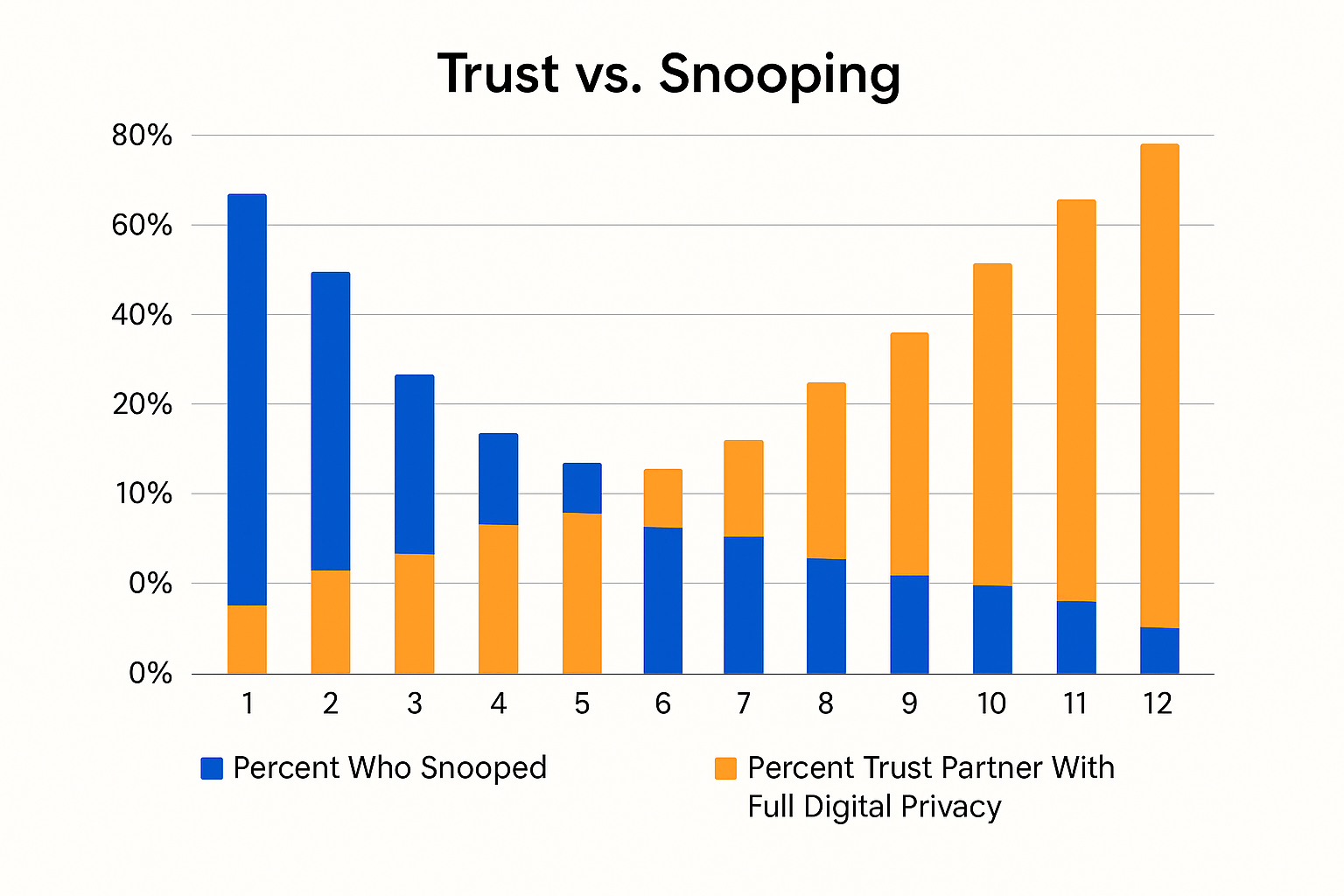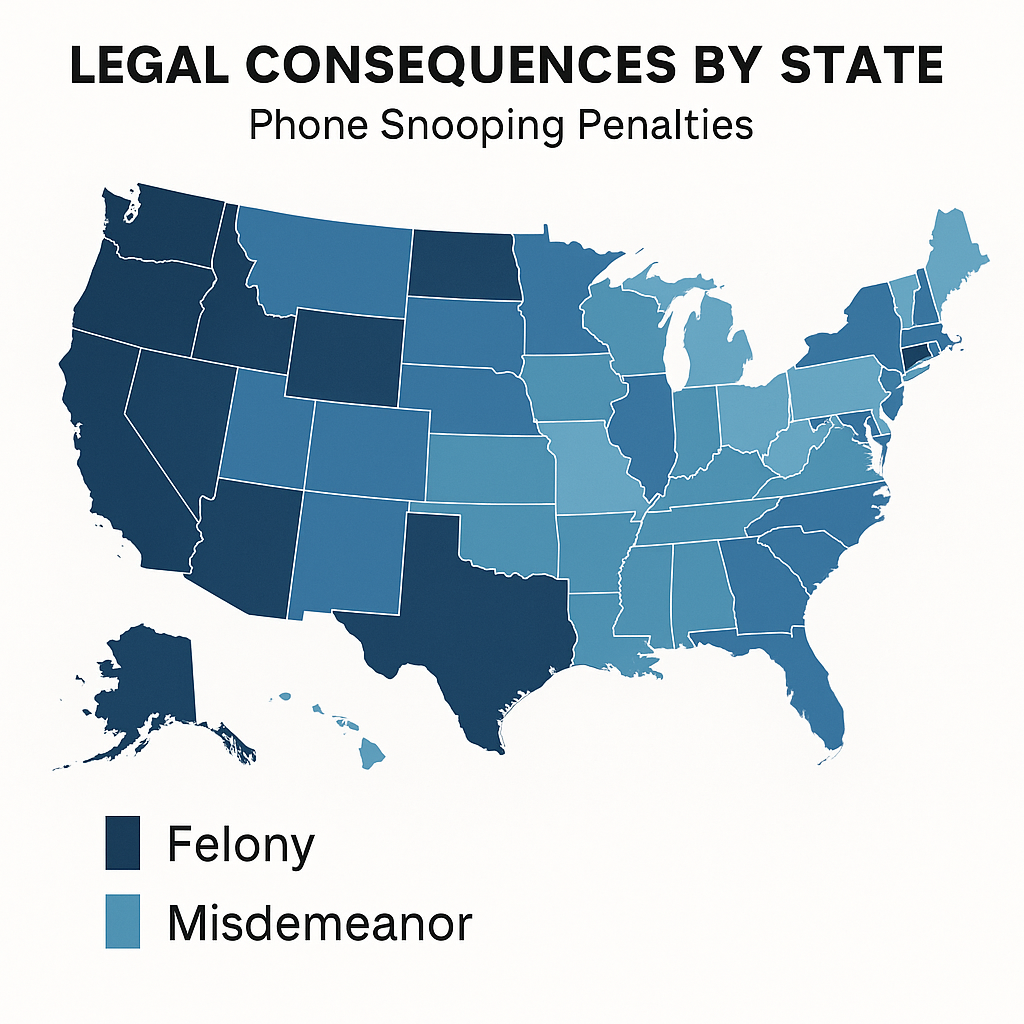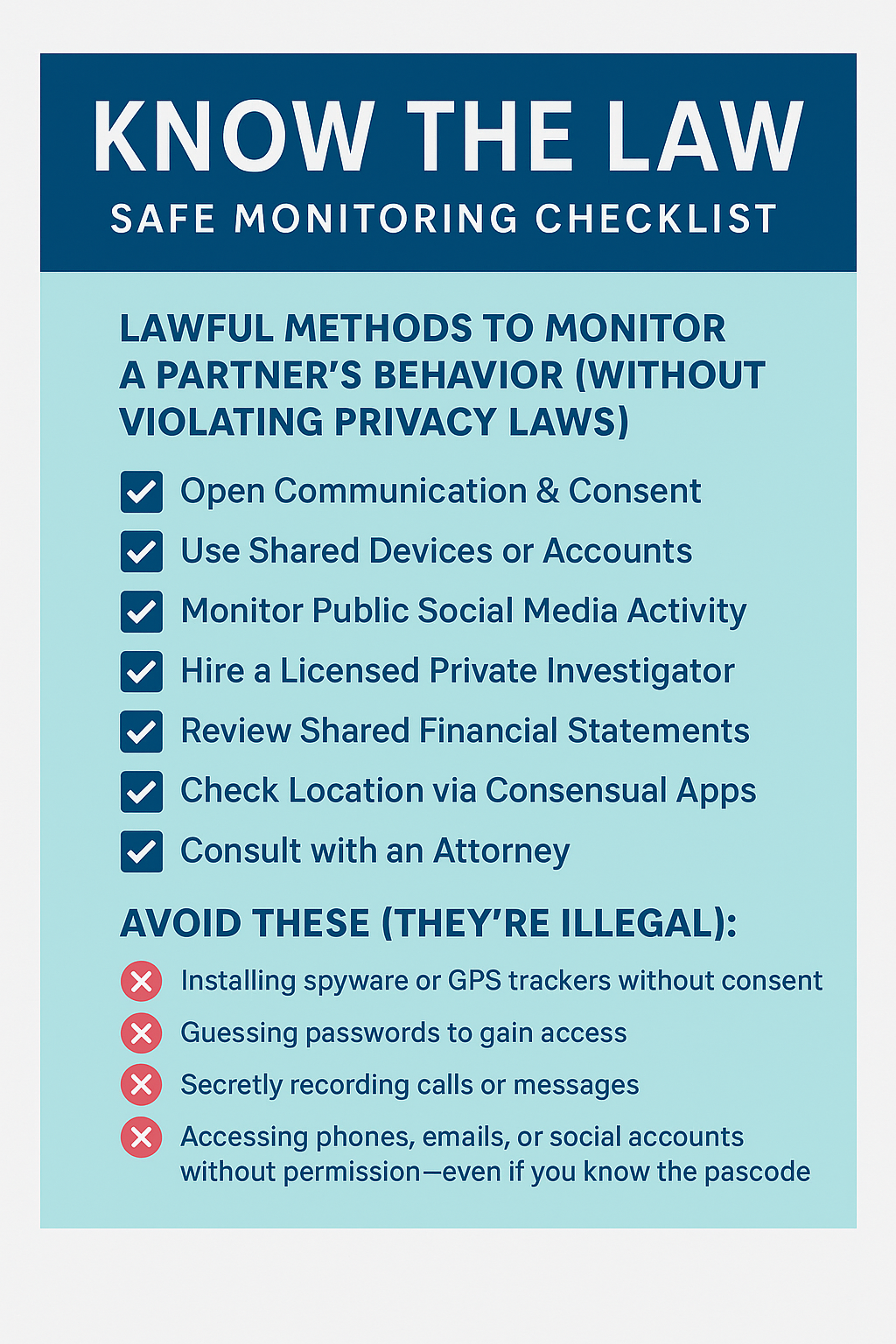Nearly a Third Of People Admit To Phone Snooping To Check Up On Their Partner – But The Legal Ramifications Can Be Dire
In many cases, the modern-day equivalent of peeking in someone’s diary is looking at the contents of their phone: texts, emails, and photographs.
The common refrain is that someone’s whole life is in there. But while getting caught reading a diary may cause serious trust issues with its author, there are additional, serious legal consequences for accessing someone’s phone without their permission, including jail time.
This study, which we began by surveying 36 respondents for their views on phone snooping etiquette, reveals that 31% of our survey group admitted to accessing someone’s phone without permission. It will also uncover why they snooped, the effects this behavior had on their relationship, and how the potentially dire legal consequences of snooping changed in some states.
Key Phone Snooping Study Findings
Phone Snooping
The main reason given by snoopers for accessing their partner’s phone was to check text message exchanges. All snoopers (100%) admitted to doing this. Other popular reasons for snooping include checking social media messages, scrolling dating app activity, and perusing recently added photos.
28% of phone snoopers admitted to accessing their partner’s phone ‘2-3 times’, while all snoopers said they had been caught in the act. And over two-thirds (67%) conceded that their behavior led to negative consequences, including arguments, breakups, and a loss of trust.
Trust And Digital Privacy
Overall, trust in a partner’s phone habits scored high among survey respondents, averaging 9 out of 10 on a trust scale. Among those who did not snoop, trust was essentially unshakable, with many reporting a perfect score of 10.
In contrast, respondents who admitted to snooping showed noticeably lower trust levels, with scores ranging between 4 and 7. Interestingly, even those with relatively high trust (a 7, for example) still felt compelled to snoop. Their reasons often stem from gut instincts or unresolved trauma linked to past deception, suggesting that trust and fear can coexist, especially when past wounds haven’t fully healed.
Legal Risk Awareness
91% of study respondents didn’t realize that snooping can lead to legal repercussions such as a fine or a jail sentence. And even after learning about such potential outcomes, most snoopers suggested potential consequences wouldn’t curb their curiosity, illustrating that emotional investment often overrides potential incrimination.
Cheating Patterns
Nearly half of all respondents (44%) said they’ve been cheated on, and 1 in 5 admitted to being cheaters. But here’s where it gets especially revealing: those who’ve experienced infidelity are four times more likely to snoop through their partner’s phone. The data paints a clear picture: once trust is broken, many people don’t just move on; they start watching their backs.
What Constitutes A ‘Dealbreaker’?
Phone snooping is one thing, but what if a snooper makes an unfortunate discovery? If suspicions are confirmed, what type of behavior is likely to cause a relationship-ending action?
This depends on what each snooper feels oversteps the mark regarding their partner’s behavior. Here are the main things respondents cited as dealbreakers.
- Physical cheating
- Activity/accounts on secret dating apps
- Emotional cheating (sending lascivious or intimate messages)
- Hiding financial details/activity
Interestingly, the act of phone snooping was seen by some respondents as a dealbreaker.

Should Phone Snooping Discoveries Be Admissible In Divorce Court?
When asked whether compromising information uncovered during a secret phone search should be allowed as evidence in divorce proceedings, respondents had mixed opinions.
Nearly half (47%) agreed that snoop evidence should be admissible. Another 36% took a more nuanced view, saying it depends on the situation. Meanwhile, 17% stood firm that such evidence shouldn’t be allowed in court at all.
How Snooping Changed Relationships
Of those canvassed, over 25% said snooping changed their relationship; of that, 25%, most admitted that the eventual outcome was negative and involved either a loss of trust or a breakup. However, a small minority suggested that snooping led to positive change in their relationship and facilitated an opportunity to confront and resolve a lot of trust issues.
Phone Snooping: Legal Permutations
But while snooping can compound or (much rarer) resolve trust issues in your relationship, phone snooping is about much more than trust. There are serious legal ramifications to consider when it comes to gaining access to your partner’s phone without their permission.
For example, the Electronic Communications Privacy Act (ECPA) means that unauthorized interception (in this case, phone snooping and reading someone else’s private exchanges) is a federal crime. If you’re found guilty, you could end up with a 5-year prison sentence and a $250,000 fine. If a business is found guilty of the same violation, the financial penalty could amount to as much as $500,000.
Many states have augmented federal law by criminalizing unauthorized interception. Examples include:
- Virginia treats unauthorized access to private communications as a Class 6 felony, which means those found guilty face between 1-5 years in jail.
- Ohio, which adjudges the interception of private electronic communications to be a fourth-degree felony, which carries a punishment of up to 18 months in jail.

Divorce Court Ramifications
Study data confirms that, alongside the illegality of collecting someone else’s private exchanges, presenting such information as evidence in court as part of divorce proceedings is problematic.
Apart from potentially earning a criminal record, fine, and jail sentence, parties that use potentially incriminating text messages to support their case almost always have said evidence disregarded as ‘inadmissible’ due to how it was collected.
Furthermore, attempting to use evidence procured by snooping may also weaken a party’s case and negatively affect the overall outcome by effectively suppressing potentially vital information and by encouraging their counterpart to destroy potentially admissible incriminating evidence.
Washington’s Position On Phone Snooping
Washington state broadly follows the national lead when it comes to the unauthorized collection of private communications, with its additional adjustments.
In Washington, it’s illegal to intercept, record, or share any private communication (phone calls, texts, DMs) without the consent of all parties involved. A violation of this law is classified as a Class C felony, punishable under general felony sentencing guidelines (RCW 9A.20) – in other words, if you snoop in Washington, you could face up to five years in jail and a $10,000 fine.
In almost all cases, information collected by snooping is generally inadmissible in court, and a judge may order that surreptitious recordings of such information must be destroyed.
Additionally, snooping may constitute a violation of Washington’s Cybercrime Act (RCW 9A.90). The Act states that unauthorized access to a ‘computer system or electronic database’ represents a second-degree gross misdemeanor (which carries a punishment of up to a year in jail and a $5,000 fine).
Because smartphones are defined as ‘computers’, this would likely apply in a phone-snooping case. Add to this Washington state’s RFID/Identification Device Law (RCW 19.300), which criminalizes the unauthorized remote scanning of electronic identification devices (and carries Class C felony tariffs), and it’s clear that the state protects individual electronic privacy with a broad suite of laws.
| Law/Statute | Prohibited Behavior | Penalty | Court Impact |
|---|---|---|---|
| RCW 9.73.030 | Intercepting cell phone communications without all‑party consent | Class C felony | Evidence inadmissible/destroyed |
| RCW 9A.90 | Unauthorized access to digital devices (e.g., phone snooping) | Gross misdemeanor to Class C felony | A criminal record harms the case |
| RCW 19.300 | Remote scanning of electronic IDs without consent | Class C felony | Adds to broader digital privacy protections |
Ultimately, Washington State takes phone snooping very seriously and ranks non-observance of its information protection statutes as significant felonies that carry harsh punishments.
So, if your client is concerned about the recovery of data or defending snooping claims, the state’s protective statutes represent firm legal obstacles.
How To Legally Monitor Your Partner’s Behavior
You don’t have to snoop! If you really want to indulge your suspicion or curiosity, there are many other far less invasive ways you can ‘keep an eye’ on your partner.
Communicate and Gain Explicit Consent
Directly ask your partner if they’re happy to share access to their device or digital accounts. Getting explicit consent is key.
Use Shared Devices or Accounts
If you use a shared family plan, device, or subscription (for example, Netflix, Apple ID), you can monitor activity that way, as long as both parties are happy with the arrangement.
Monitor Public Social Media Activity
You can easily and legally observe what someone posts publicly online (Facebook, Instagram, TikTok), especially if you’re friends.
Hire a Licensed Private Investigator
An extreme measure, but if you’re curious about your partner’s behavior, you can legally commission a private investigator to carry out a surveillance program, as long as they don’t trespass on private property or hack any personal devices.
Review Shared Financial Statements
If you have joint bank or credit card accounts with your partner, you’re entitled to scrutinize associated statements: you may find evidence of some unusual transactions that could help you uncover a serious issue.
Monitor Their Location With Consensual Apps
You could use apps like Life360 or Find My iPhone: both are legal means of tracking activity, as long as your partner has opted in.
Consult an Attorney
An attorney could offer you legal help if you want to issue subpoenas for records, especially if your case involves infidelity, custody, or financial misconduct.

Don’t Resort To Any Of These Approaches (They’re Illegal!)
Install spyware or GPS trackers without consent. Guess passwords to gain access, or in any way gain access to phones, emails, or social accounts without permission—even if you already know the passcode.
Secretly record calls or messages.
Phone Snooping: Not Worth The Risk
Ultimately, if you want to monitor your partner’s behavior, there are ways to do it without putting yourself at risk of a hefty fine or prison term.
If you access your partner’s phone and snoop around without their permission, you’re asking for trouble. It’s surely far better to have a difficult conversation around better communication and transparency or confront your partner outright than put yourself, your career, and potentially your whole family in serious jeopardy.
Phone snooping might feel like a quick and easy fix, but it can have dire long-term consequences. At Dellino Family Law Group, we’ve been through every kind of stressful and crazy situation. We provide the best representation in the greater Seattle area for comprehensive and personalized Family Law.
Our experienced attorneys deal with many high-conflict divorce cases as well as all common family law situations. Get in touch with us today if you think we can help!
